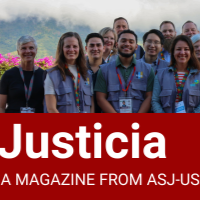When the road doesn’t go any higher, you’ll have reached Gerson’s [pronounce “Hair-son”] house. It’s built on one of the few relatively flat pieces of ground here in Tegucigalpa ‘s Villa Cristina neighborhood. But until recently, living there was in some ways just as precarious as living in nearby houses that keep an unsteady grip on sheer cliff faces.
The reason: Gerson had no legal title to the lot his home is built on.
“I’ve lived here since this neighborhood was settled 28 years ago,” says Gerson, who is not much older. “And we’ve been fighting to get title to our land all this time.”
Part of the problem was that no one knew who the previous owner was. “Some people said it was the city government. Others said it was doña Cristina [a member of Tegucigalpa ‘s elite]. We didn’t know who to believe, and we were afraid that if we paid someone for our title, it might end up being the wrong person and that money would just disappear.”
A Property Law passed by Honduras’ congress in 2004—thanks in part to ASJ (formerly known as AJS)-sponsored advocacy—set up a system to finally get clear, valid titles for Gerson and his neighbors. Under the law, the government expropriated all of the property in the Villa Cristina, then began selling valid, affordably priced titles to the residents. If in-depth investigations showed doña Cristina’s ownership claims to be true, she would be repaid for the expropriated land.
But that didn’t solve Gerson and his neighbors’ problems completely. Under the new law, residents must pay not only for their own lots but also for a portion of their neighborhood’s public spaces, such as community centers, soccer courts, and green spaces.
The problem was, according to the pricing setup slapped together by government officials who did little to consult Villa Cristina residents on the matter, many people were being charged more for the public spaces than for their own plots.
Residents complained that they had been better off buying titles from the dodgy doña Cristina—while the legitimacy of her ownership of the neighborhood’s land was doubtful, at least she charged less!
Complaints about the high title prices set by the government weren’t just empty bickering. Many Villa Cristina residents, especially those who live even higher up the mountainside than Gerson in houses reached only by steep staircases and paths, survive by scavenging in Tegucigalpa ‘s nearby municipal dump. Paying just for their titles would already be hard enough without the overblown public spaces fee.
“It seemed like all was lost, and we would be stuck paying this exaggerated price,” says Gerson. “But ASJ turned that all around.”
The ASJ Land Rights team has been teaching communities about the Property Law, accompanying and backing them up in the titling process, and keeping on eye on government officials in charge of implementing the law since it was passed.
When ASJ Land Rights lawyer Gilda (pronounce “Hilda”) and educator Ericka heard about the situation in the Villa Cristina, they set up a meeting with community leaders and government officials that resulted in the government lowering the price to a more affordable level.
Gerson and his family now rest easier knowing their land is incontrovertibly theirs. And now even their poorest neighbors have a better chance of getting their own titles too.
















